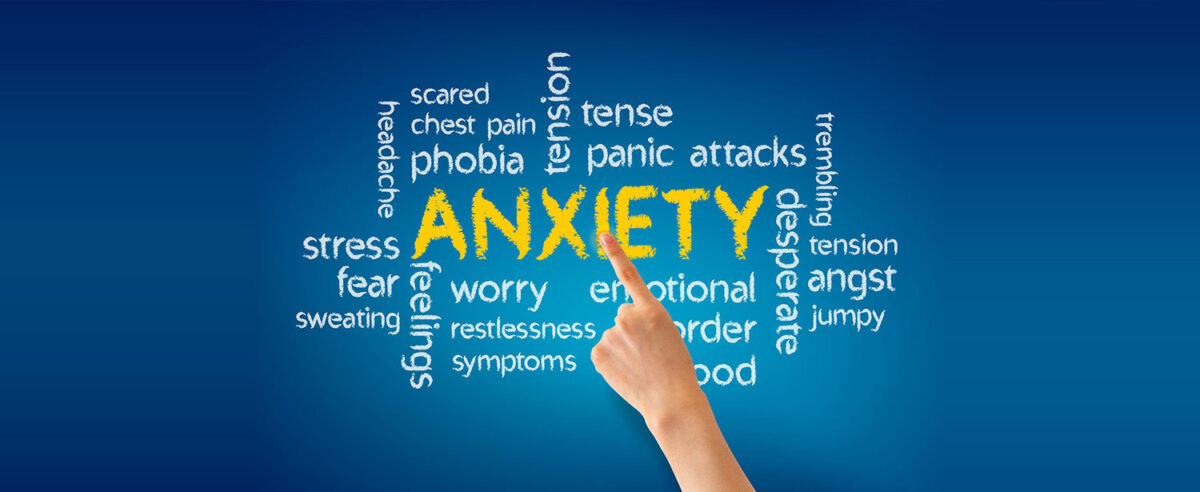
The body’s natural defense mechanism, anxiety, kicks in when it senses danger. It is a person’s response to a perceived or actual threat or worry. ‘Overwhelm’ is a suitable expression to use in casual conversation while describing anxiety. People often suffer mental and physical symptoms during this reaction, including anxiety, perspiration, tense muscles, elevated heart rate, and difficulty concentrating.
Anxiety can show up as a chronic state of worry and anxiety or as a specific time when there is a threat. Anxiety disorders may be indicated when anxiety exceeds normal levels and interferes with day-to-day functioning. Treatment for these conditions that adversely affect a person’s day-to-day functioning is crucial.
What Anxiety Symptoms Are There?
Depending on the type of anxiety condition, distinct complaints may be seen, even though anxiety symptoms and their effects can range from person to person. But generally speaking, the following is a list of complaints that can arise as a result of anxiety:
The physical manifestations of anxiety include: • Fast or irregular heartbeat • Sweating • Headaches • Abdominal pain or stomach discomfort • Constipation or diarrhea • Tense or trembling muscles • Dizziness • Fatigue
The emotional signs of anxiety include
Continuous feelings of worry or anxiety – Fear or panic episodes – Inner restlessness – Impatience, easily agitated, and prone to anger – Difficulty focusing (maintaining focus) – Persistent anxious thoughts – Phobias or fears
Anxiety’s Behavioral Symptoms
- Constant need for control or assurance; • Sleep issues (high arousal); • Social disengagement; • Mood swings or anger; • Avoidance behaviors (avoidance of social interaction, avoidance of particular situations);
Anxiety’s Cognitive Symptoms: • Constantly worrying thoughts
Fears or phobias; negative expectations; a persistent feeling of danger; guilt; or excessive or irrational thought
What Causes Anxiety
The causes of anxiety can differ from person to person because it can stem from a variety of intricate reasons. Anxiety can occasionally be brought on by a number of circumstances. On the other hand, when considering the condition as a whole, variables including genetics and family history may play a role in its development. Anxiety is a condition that is influenced by genetics, like many other conditions. Anxiety is more likely to strike a person whose families have a history of anxiety.
Chemistry of the Brain
Anxiety can result from a number of situations, including modifications to brain chemistry. Specifically, anxiety disorders are known to be exacerbated by an imbalance in neurotransmitters like norepinephrine and serotonin.
Environmental and Social Factors: As with many psychological disorders, the development of anxiety is influenced by a number of factors, including abuse, stress within the family, traumatic childhood events, and environmental stressors. Furthermore, a life of extreme stress may also play a role in the emergence of anxiety disorders. Anxiety can also be made worse by social variables including social isolation, difficult relationships, or stress at work.
Aside from personality features, substance abuse, and specific medical disorders are some other reasons that might lead to the development of anxiety. It’s critical to recognize that a variety of factors contribute to the emergence of anxiety disorders. It could be necessary to seek professional assistance in order to comprehend these issues and choose the best course of action.
What Kinds of Anxiety Disorders Are There
The symptoms and triggers of various forms of anxiety disorders differ. As a result, choosing the right diagnosis is crucial to the course of treatment.
Anxiety Disorder in General (GAD)
The illness known as generalized anxiety disorder (GAD) causes a person to constantly worry and feel anxious. A person suffering from generalized anxiety disorder constantly expresses worries about their family, career, health, and future. This worry frequently strikes for no apparent reason and interferes with the person’s day-to-day activities.
Social Phobia/Social Anxiety Disorder
The extreme anxiety that a person feels when interacting with people or in a group is known as social anxiety disorder. The dread of acting awkwardly or harshly toward others in public is linked to this kind of anxiety.
Among the anxiety disorders, panic disorder is typified by avoidance behavior and unprovoked panic attacks, as well as the worry that they might happen again. Severe physical symptoms including palpitations, shaking, or shortness of breath are common during panic attacks. These attacks, accompanied by intense terror, cause the individual with panic disorder to live in continual fear of having an attack.
Particular Fear
Extreme fear and avoidance behaviors linked to particular things, circumstances, or activities are characteristics of distinct phobias. Animal phobias, height anxiety, and fear of flying are a few examples.
How is the Disorder of Anxiety Treated?
It is possible to treat anxiety illness effectively. The important thing to remember in this case is to accurately diagnose the patient’s condition and adjust the course of treatment based on the patient’s needs, characteristics, and level of symptom severity.
Anxiety can be treated with a variety of strategies, either alone or in combination, including medication, lifestyle modifications, psychotherapy, and support groups.
